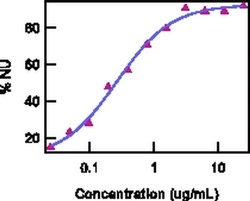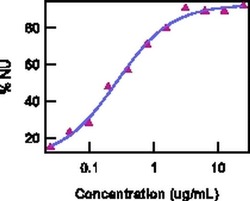Antibody data
- Antibody Data
- Antigen structure
- References [2]
- Comments [0]
- Validations
- Functional assay [1]
- Other assay [1]
Submit
Validation data
Reference
Comment
Report error
- Product number
- 16-5236-82 - Provider product page

- Provider
- Invitrogen Antibodies
- Product name
- IL-23 p19 Monoclonal Antibody (HNU2319), Functional Grade, eBioscience™
- Antibody type
- Monoclonal
- Antigen
- Other
- Description
- Description: The HNU2319 monoclonal antibody is specific to the p19 subunit of human IL-23, a heterodimeric cytokine made up of two covalently linked subunits, p40 and p19. It is closely related to IL-12, with which it shares the p40 subunit. Dendritic cells and macrophages produce IL-23 in response to TLR2, TLR4, and TLR8 ligands, as well as the beta-glucan receptor Dectin-1. Human IL-23 induces proliferation of memory T cells and induces moderate levels of IFN-gamma production by naive and memory T cells, as compared to IL-12. In contrast, the mouse IL-23 biological activities are more distinctly different than those of mouse IL-12 suggesting the signaling or response elements (receptors) differ between species. The IL-23 receptor is also heterodimeric and shares the IL-12Rbeta1 chain with IL-12, while the IL-23R chain is unique to IL-23. Signaling occurs through the Jak/STAT pathway and results in RORgammat expression, which drives the differentiation of CD4^+ T-cells towards the Th17 phenotype. The monoclonal antibody HNU2319 neutralizes the bioactivity of IL-23 without affecting IL-12. Applications Reported: The monoclonal antibody HNU2319 reacts with the p19 subunit of human IL-23 and inhibits its bioactivity. Applications Tested: The ND50 of HNU2319, as determined by the neutralization of mouse IL-17A induction in balb/c splenocytes by recombinant human IL-23, is 0.2-0.4 µg/mL in the presence of 2 ng/mL IL-23. This antibody is specific to the p19 subunit of IL-23, and will not affect the bioactivity of IL-12. The neutralization dose of this antibody will vary depending on cell type, assay method, and concentration of cytokine. Storage and handling: Use in a sterile environment. Filtration: 0.2 µm post-manufacturing filtered. Purity: Greater than 90%, as determined by SDS-PAGE. Endotoxin Level: Less than 0.001 ng/µg antibody, as determined by LAL assay. Aggregation: Less than 10%, as determined by HPLC.
- Reactivity
- Human
- Host
- Mouse
- Isotype
- IgG
- Antibody clone number
- HNU2319
- Vial size
- 100 μg
- Concentration
- 1 mg/mL
- Storage
- 4°C
Submitted references Periodontitis-associated pathogens P. gingivalis and A. actinomycetemcomitans activate human CD14(+) monocytes leading to enhanced Th17/IL-17 responses.
Reciprocal regulation of IL-23 and IL-12 following co-activation of Dectin-1 and TLR signaling pathways.
Cheng WC, van Asten SD, Burns LA, Evans HG, Walter GJ, Hashim A, Hughes FJ, Taams LS
European journal of immunology 2016 Sep;46(9):2211-21
European journal of immunology 2016 Sep;46(9):2211-21
Reciprocal regulation of IL-23 and IL-12 following co-activation of Dectin-1 and TLR signaling pathways.
Dennehy KM, Willment JA, Williams DL, Brown GD
European journal of immunology 2009 May;39(5):1379-86
European journal of immunology 2009 May;39(5):1379-86
No comments: Submit comment
Supportive validation
- Submitted by
- Invitrogen Antibodies (provider)
- Main image

- Experimental details
- Neutralization of Human IL-23 Recombinant Protein activity as measured by IL-17A induction in BALB/c splenocytes.
Supportive validation
- Submitted by
- Invitrogen Antibodies (provider)
- Main image

- Experimental details
- Neutralization of Human IL-23 Recombinant Protein activity as measured by IL-17A induction in BALB/c splenocytes.
 Explore
Explore Validate
Validate Learn
Learn Blocking/Neutralizing
Blocking/Neutralizing Functional assay
Functional assay